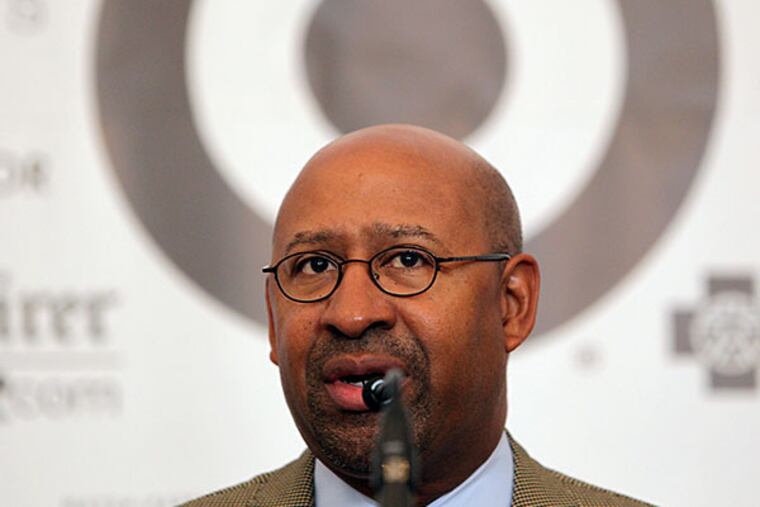As underfunded pension system doles out checks, Nutter balks
Sometime as early as April, Philadelphia's beleaguered pension fund will begin sending out $62 million in bonus checks to retirees.

Sometime as early as April, Philadelphia's beleaguered pension fund will begin sending out $62 million in bonus checks to retirees.
It will do so despite being woefully underfunded - it has less than 48 percent of its $10 billion in obligations - and sucking up an ever-growing portion of the city's overall revenue.
It is required to make the payments as a result of legislation championed eight years ago by then-City Councilman James F. Kenney, who is seeking the Democratic nomination for mayor in the May primary.
Under the 2007 law change, sponsored by Kenney, the pension fund - regardless of how underfunded it might be - is required to share some of its good fortune with retirees if it manages to outperform its investment goals.
Kenney, at the time, said it was only "fair" to help pensioners on fixed incomes when things were going well. "I recognize the downside to it, but in the end, I think these individuals deserve it," he said.
Then-Mayor John F. Street opposed the bill, calling it "charitably motivated" but taking the city "in the wrong direction."
And current Mayor Nutter said Tuesday that the law is financially irresponsible and raises questions about Kenney's judgment as a mayoral candidate.
"We cannot always do everything we want, even if those things are to make people feel better," Nutter said. "To run a big city, you have to not only deal with the issues of the present, but you need to be able to see the long-term impact of your actions."
Kenney, through a spokeswoman, stood by the pension payments.
"There are obviously serious, systemic problems with the pension fund," said Lauren Hitt. "He does not deny that. But it will take a multiple-solution approach to get to a place where it is stable. We should not do it on the backs of our seniors."
Hitt further argued that the payments were insignificant when compared to the size of the pension fund.
"The $62 million seniors are receiving is coming out of a $5 billion pension fund," she said. "That's $5 billion currently sitting in the pension fund, even at its underfunded level, so while Kenney's bill certainly doesn't do anything to grow the pension fund, it also moves the needle relatively little in the other direction - it's a 1.24% decrease to be exact."
The looming payments, first reported last week by Bloomberg News, will come from the Pension Adjustment Fund, created in 1999 as a way of providing cost-of-living boosts to retirees when the overall pension fund exceeded investment goals by at least 1 percent over a five-year period.
Initially the pension fund was required to be at least 76.7 percent solvent before such bonus payments could be made. That limit was a safeguard against overspending from a weakened fund.
Kenney's bill eliminated that limit. Then-acting Finance Director Vincent Jannetti called it "fiscally irresponsible to divert funds" from "one of the most poorly funded pensions of major U.S. cities."
The bill was seen in some quarters as a sop to city workers by Council members facing reelection.
"Purely for political reasons, from my perspective, in an election year, City Council removed the minimum threshold," said Nutter, who was not in office at that time. "In doing so, from my perspective, they jeopardized the future health of the pension fund in a significant way."
Finance Director Rob Dubow said the pension fund crisis has taken an increasingly larger bite of the city's revenue over time. About 7 percent of the budget went to the pension fund a decade ago, he said, a figure that is now up to 15 percent.
"Those are dollars we would otherwise spend on city services for everybody, retirees and the rest of our citizens," Nutter said.
The last time the pension fund sent out bonus checks was in 2008, when it had about $40.5 million available, according to Francis Bielli, executive director of the Philadelphia Board of Pensions and Retirement.
The financial crash guaranteed that the fund underperformed for a number of years, he said. As of June 2014, however, the fund had averaged 11.5 percent over five years. Its goal had been 7.85 percent. Thus, the $62 million bonus pool available now.
215-854-2594